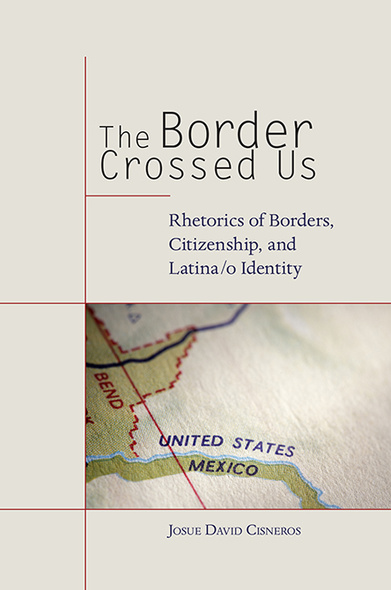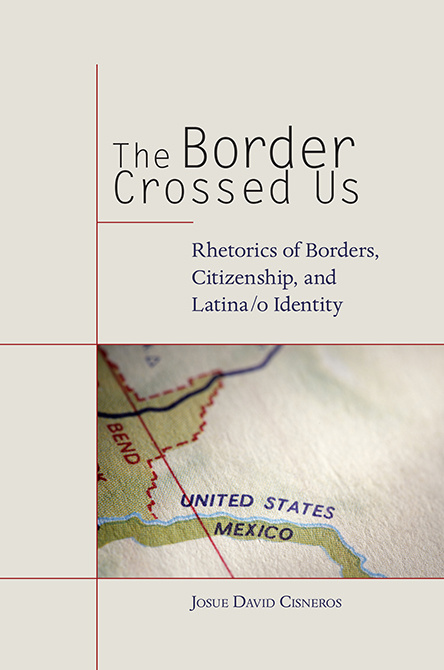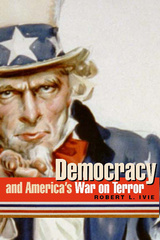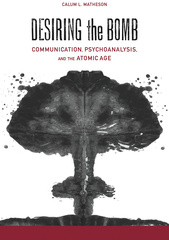Our shopping cart is currently down. To place an order, please contact our distributor, UTP Distribution, directly at utpbooks@utpress.utoronto.ca.
The Border Crossed Us
Rhetorics of Borders, Citizenship, and Latina/o Identity
University of Alabama Press
Explores efforts to restrict and expand notions of US citizenship as they relate specifically to the US-Mexico border and Latina/o identity
Borders and citizenship go hand in hand. Borders define a nation as a territorial entity and create the parameters for national belonging. But the relationship between borders and citizenship breeds perpetual anxiety over the purported sanctity of the border, the security of a nation, and the integrity of civic identity.
In The Border Crossed Us, Josue David Cisneros addresses these themes as they relate to the US-Mexico border, arguing that issues ranging from the Mexican-American War of 1846–1848 to contemporary debates about Latina/o immigration and border security are negotiated rhetorically through public discourse. He explores these rhetorical battles through case studies of specific Latina/o struggles for civil rights and citizenship, including debates about Mexican American citizenship in the 1849 California Constitutional Convention, 1960s Chicana/o civil rights movements, and modern-day immigrant activism.
Cisneros posits that borders—both geographic and civic—have crossed and recrossed Latina/o communities throughout history (the book’s title derives from the popular activist chant, “We didn’t cross the border; the border crossed us!”) and that Latina/os in the United States have long contributed to, struggled with, and sought to cross or challenge the borders of belonging, including race, culture, language, and gender.
The Border Crossed Us illuminates the enduring significance and evolution of US borders and citizenship, and provides programmatic and theoretical suggestions for the continued study of these critical issues.
Borders and citizenship go hand in hand. Borders define a nation as a territorial entity and create the parameters for national belonging. But the relationship between borders and citizenship breeds perpetual anxiety over the purported sanctity of the border, the security of a nation, and the integrity of civic identity.
In The Border Crossed Us, Josue David Cisneros addresses these themes as they relate to the US-Mexico border, arguing that issues ranging from the Mexican-American War of 1846–1848 to contemporary debates about Latina/o immigration and border security are negotiated rhetorically through public discourse. He explores these rhetorical battles through case studies of specific Latina/o struggles for civil rights and citizenship, including debates about Mexican American citizenship in the 1849 California Constitutional Convention, 1960s Chicana/o civil rights movements, and modern-day immigrant activism.
Cisneros posits that borders—both geographic and civic—have crossed and recrossed Latina/o communities throughout history (the book’s title derives from the popular activist chant, “We didn’t cross the border; the border crossed us!”) and that Latina/os in the United States have long contributed to, struggled with, and sought to cross or challenge the borders of belonging, including race, culture, language, and gender.
The Border Crossed Us illuminates the enduring significance and evolution of US borders and citizenship, and provides programmatic and theoretical suggestions for the continued study of these critical issues.
The Border Crossed Us is a fascinating and important interpretation of the meaning of borders in U.S. history. Josue David Cisneros argues that borders not only delineate physical space but also define the boundaries of belonging in the United States, shifting and changing over time. . . . By using examples from different centuries, Cisneros shows that anxieties permeating from the borderline have been both adopted and resisted across the United States at various points in time. Ideas of belonging and social identity shifted with the boundaries along the way. He is especially adept at showing how Latinos/as have contributed to this process. . . . The book is smart, and its incorporation of a wide array of historical examples opens it to use across various disciplines.'
—New Mexico Historical Review
'Josue David Cisneros’ The Border Crossed Us offers an important addition from rhetoric studies. The book provides a stellar example of rhetorical historiography applied toquestions of the U.S.–Mexico Border, citizenship, and Latina/o identity.'
—Rhetoric Society Quarterly
'The Border Crossed Us offers an ambitious and instructive argument for the continued relevance of the figure of the border in U.S. public culture. Marking an important contribution to the burgeoning field of rhetorical border studies, The Border Crossed Us will both inform and provoke future scholarship on the rhetorical production of borders, citizenship, and belonging.'
—Rhetoric and Public Affairs
'The Border Crossed Us illustrates that it need not be—indeed cannot be—an either/or choice between stark dichotomies; the tensions of the border cross us all, whether we acknowledge them or not, making easy or uncomplicated notions of citizenship and belonging impossible. Cisneros' work exemplifies both a faith in the struggle and in the power of critical rhetorical practice to illuminate the way.'
—Quarterly Journal of Speech
‘The Border Crossed Us makes a unique and significant contribution to rhetorical studies and Latina/o studies by advancing an inclusive theoretical focus on the border and the intersections between rhetoric, borders, belonging, and Latinidad. The specific case studies provide a welcome breadth of textual material that will appeal to Latina/o rhetorical and communication scholars from myriad methodological orientations.’
—Darrel Allan Wanzer, editor of The Young Lords: A Reader
Josue David Cisneros is an assistant professor in the Department of Communication at the University of Illinois, Urbana-Champaign.












